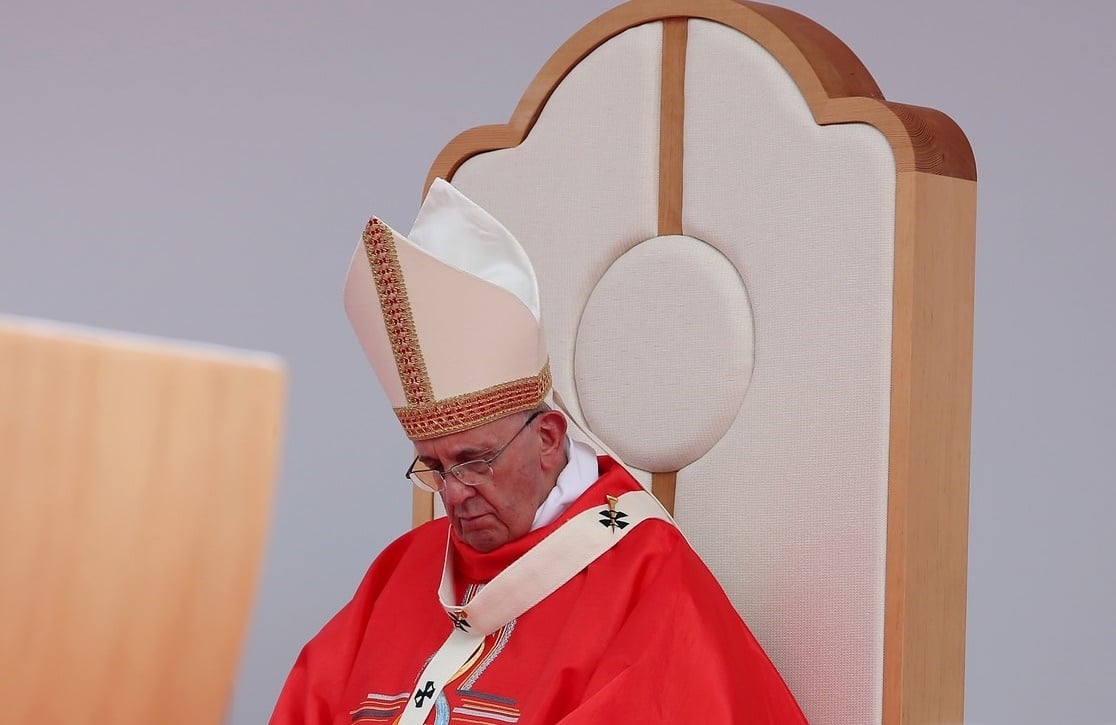
The truncated statement, “Who am I to judge?,” caused a lot of consternation among certain kinds of Catholics. Some of them saw it as the prelude to a Church blessing of same-sex marriage. Others thought it was the prelude to the utter decline of Church into zeitgeist affirming irrelevance. Few read the statement in context. Let’s dive into it despite the fact that, as T.S. Eliot put it in The Four Quartets, “human kind / Cannot bear very much reality.”
Amoris Laetitia lays out the Church’s teaching clearly on same-sex unions:
In discussing the dignity and mission of the family, the Synod Fathers observed that, “as for proposals to place unions between homosexual persons on the same level as marriage, there are absolutely no grounds for considering homosexual unions to be in any way similar or even remotely analogous to God’s plan for marriage and family”. It is unacceptable “that local Churches should be subjected to pressure in this matter and that international bodies should make financial aid to poor countries dependent on the introduction of laws to establish ‘marriage’ between persons of the same sex.”
This comes as no surprise since in his recently released book-long interview, The Name of God is Mercy, Pope Francis already clarified how the “Who am I to judge?” statement was not a departure from traditional Catholic teaching:
On that occasion I said this: If a person is gay and seeks out the Lord and is willing, who am I to judge that person? I was paraphrasing by heart the Catechism of the Catholic Church where it says that these people should be treated with delicacy and not be marginalized.
I am glad that we are talking about ‘homosexual people’ because before all else comes the individual person, in his wholeness and dignity. And people should not be defined only by their sexual tendencies: let us not forget that God loves all his creatures and we are destined to receive his infinite love. I prefer that homosexuals come to confession, that they stay close to the Lord, and that we pray all together. You can advise them to pray, show goodwill, show them the way, and accompany them along it.
Here is the passage from the Catechism of the Catholic Church (#25338) paraphrased by the pope and also footnoted in the passage from Amoris Laetitia I quoted above:
The number of men and women who have deep-seated homosexual tendencies is not negligible. This inclination, which is objectively disordered, constitutes for most of them a trial. They must be accepted with respect, compassion, and sensitivity. Every sign of unjust discrimination in their regard should be avoided. These persons are called to fulfill God’s will in their lives and, if they are Christians, to unite to the sacrifice of the Lord’s Cross the difficulties they may encounter from their condition.
Finally, for those who are still doubtful, going on what they’ve read in the press, here is the full context of the “Who am I to judge statement?” from the press conference on a flight from Rio to Rome:
Ilze Scamparini
I would like permission to ask a delicate question: another image that has been going around the world is that of Monsignor Ricca and the news about his private life. I would like to know, Your Holiness, what you intend to do about this? How are you confronting this issue and how does Your Holiness intend to confront the whole question of the gay lobby?
Pope Francis
About Monsignor Ricca: I did what canon law calls for, that is a preliminary investigation. And from this investigation, there was nothing of what had been alleged. We did not find anything of that. This is the response. But I wish to add something else: I see that many times in the Church, over and above this case, but including this case, people search for “sins from youth”, for example, and then publish them. They are not crimes, right? Crimes are something different: the abuse of minors is a crime. No, sins. But if a person, whether it be a lay person, a priest or a religious sister, commits a sin and then converts, the Lord forgives, and when the Lord forgives, the Lord forgets and this is very important for our lives. When we confess our sins and we truly say, “I have sinned in this”, the Lord forgets, and so we have no right not to forget, because otherwise we would run the risk of the Lord not forgetting our sins. That is a danger. This is important: a theology of sin. Many times I think of Saint Peter. He committed one of the worst sins, that is he denied Christ, and even with this sin they made him Pope. We have to think a great deal about that. But, returning to your question more concretely. In this case, I conducted the preliminary investigation and we didn’t find anything. This is the first question. Then, you spoke about the gay lobby. So much is written about the gay lobby. I still haven’t found anyone with an identity card in the Vatican with “gay” on it. They say there are some there. I believe that when you are dealing with such a person, you must distinguish between the fact of a person being gay and the fact of someone forming a lobby, because not all lobbies are good. This one is not good. If someone is gay and is searching for the Lord and has good will, then who am I to judge him? The Catechism of the Catholic Church explains this in a beautiful way, saying … wait a moment, how does it say it … it says: “no one should marginalize these people for this, they must be integrated into society”. The problem is not having this tendency, no, we must be brothers and sisters to one another, and there is this one and there is that one. The problem is in making a lobby of this tendency: a lobby of misers, a lobby of politicians, a lobby of masons, so many lobbies. For me, this is the greater problem. Thank you so much for asking this question. Many thanks.
There you have it. There’s nothing jesuitical about saying this pope is Catholic. He wasn’t talking about same-sex marriage, instead he was talking about, in a tough but pastoral manner, the Vatican’s alleged “gay lobby.”
Reality is frequently different than appearance. This is the reason why we need philosophical hermeneutics.
* * * * * * * * * * * * * * * * * * * * * * * * * * * *
For something completely different, yet surprisingly similar, see Zizek: Straight Marriage is Daring When Ordained Transgression is the Norm!
* * * * * * * * * * * * * * * * * * * * * * * * * * * *
Please also consider making a donation to this blog through the donation button on the upper right side of its homepage.
Stay in touch! Like Cosmos the in Lost on Facebook:












